AI Contribution
At HealthSpectra, we may use AI to refine grammar and structure, but every piece is shaped, checked, and approved by real people, our expert writers and editors, to ensure clarity, credibility, and care. Learn more..Affiliate Disclaimer
Some links in this article are affiliate links. We may earn a small commission if you make a purchase through these links, at no extra cost to you. We only recommend products we find useful to our readersFeeling tired after meals is common for most of us and is often due to factors like consuming too much food, eating high-glycemic index (GI) foods, or eating imbalanced meals, which lead to energy crashes. This condition is post-meal fatigue, which disrupts productivity and makes you feel sluggish.
Choose foods that provide sustained energy throughout the day. Incorporate foods for sustained energy into your diet to stay alert and focused.
In this article, we will explore a fatigue-fighting diet, clever snacking ideas, and lifestyle tips as a part of post-meal fatigue solutions to keep your energy levels steady from morning to night.
Foods That Fight Fatigue
Your food choices have a significant impact on your energy levels. Incorporate the right foods into your diet to combat fatigue and keep you alert all day. Here’s a breakdown of fatigue-fighting foods:
1. Complex Carbohydrates
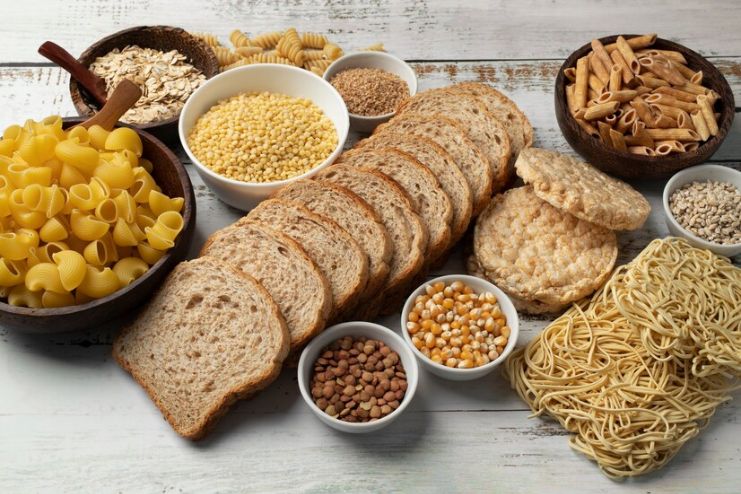
Complex carbohydrates help slow and steady energy release as they are digested slowly and gradually over time (R). This prevents blood sugar spikes and energy crashes, often with simple carbohydrates.
Some examples of complex carbohydrates are whole grains, legumes, quinoa, oats, and sweet potato.
2. Protein-Rich Foods
Protein balances blood sugar levels and supports muscle growth and repair, balancing your energy levels (R).
Some examples are legumes, nuts, seeds, lean meats, eggs, and fish.
3. Healthy Fats
Omega-3 fatty acids are healthy fats that provide long-lasting energy, support brain function, and reduce fatigue.
Avocados, nuts, seeds, olive oil, and fatty fish like salmon.
4. Iron-Rich Foods
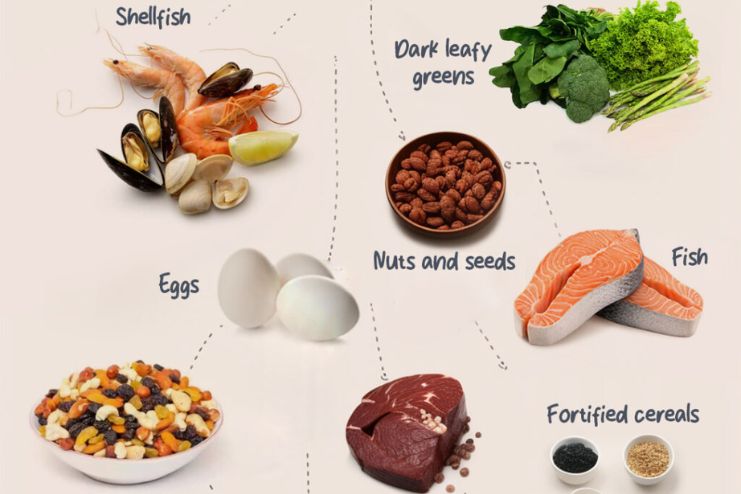
Iron is essential for oxygen transportation in the body. Iron deficiency leads to anemia, causing fatigue (R). Consume them with vitamin C-rich foods to improve iron absorption.
Some examples include lentils, spinach, fortified cereals, pumpkin seeds, and red meat.
5. Vitamin C-rich foods
Vitamin C improves iron absorption, helping combat fatigue caused by iron deficiency. Iron-rich foods can enhance energy levels and support immune function (R).
Some examples include Bell peppers, broccoli, oranges, strawberries, and kiwis.
6. High-Fiber Foods
The high fiber content of food slows digestion, ensuring a steady release of energy throughout the day (R). It also helps control blood glucose and cleanse the gut.
Some examples are lentils, whole grains, beans, vegetables, and fruits.
7. Hydrating Foods
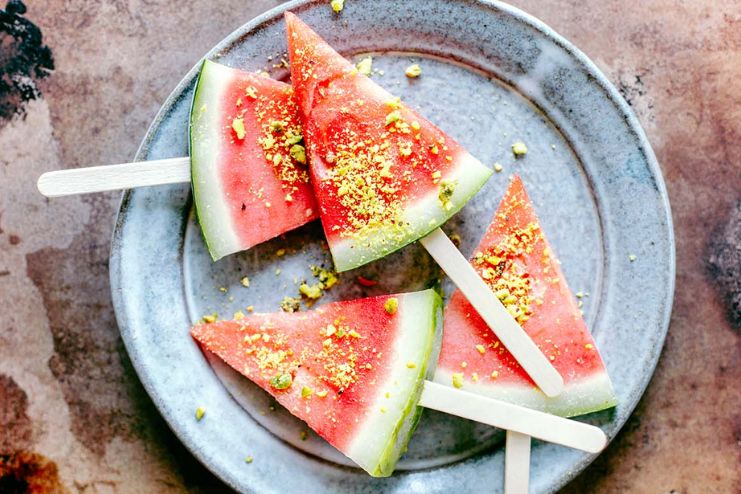
Dehydration causes fatigue; water-rich foods hydrate the body and provide sufficient energy. Eat one such food while continuing to drink adequate water throughout the day.
Cucumbers, celery, oranges, and watermelons are some examples.
8. Magnesium-Rich Foods
Magnesium helps with energy production, muscle relaxation, and fatigue reduction (R). Include magnesium-rich foods to support nerve function, regulate blood sugar levels, and maintain a steady heartbeat.
Bananas, almonds, spinach, and dark chocolate are some examples.
9. B-Vitamin Foods
B vitamins, especially B6 and B12, help with energy metabolism and the production of red blood cells (RBC) (R). They also help maintain brain health, reduce fatigue, and support a healthy nervous system.
Some examples include fortified cereals, dairy products, eggs, fish, and chicken.
10. Low-Glycemic Index (GI) Foods
Low-GI foods help sustain energy by preventing sharp fluctuations in blood glucose levels (R). They also help in a steady release of energy, keeping you fuller for longer.
Some examples are whole grains, non-starchy vegetables, and whole fruits like apples and pears.
Smart Snacking Strategies
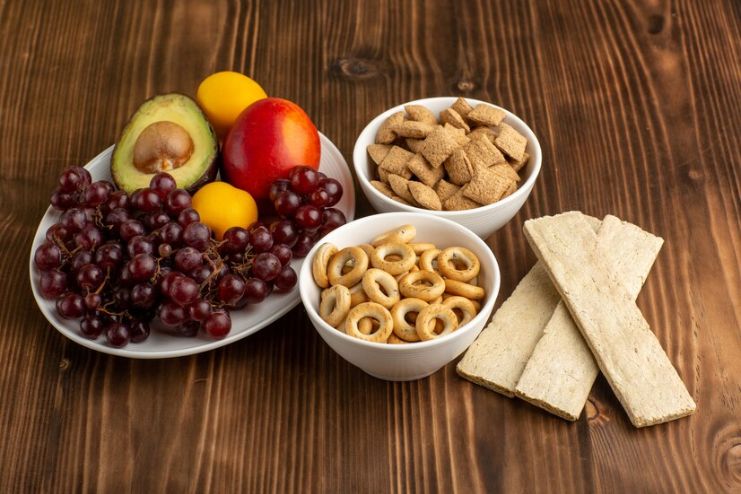
Snacking can help maintain your energy levels and combat fatigue throughout the day. However, you need to do it mindfully. Choosing the right snack stabilizes blood sugar levels and provides required nutrients.
Here are some of the innovative snacking ideas you can try to fight fatigue and boost your energy levels:
1. Prioritize Protein and Fiber
Protein and fiber work together to provide sustained energy and prevent hunger.
Some examples are whole-grain crackers, hummus with carrot sticks, Greek yogurt with a handful of berries, and a boiled egg.
2. Choose Whole Foods Over Processed Snacks
Whole foods are nutrient-rich, devoid of added sugars and unhealthy fats that often cause energy crashes.
Vegetable sticks, fresh fruits, nuts, and seeds are some examples.
3. Incorporate Healthy Fats
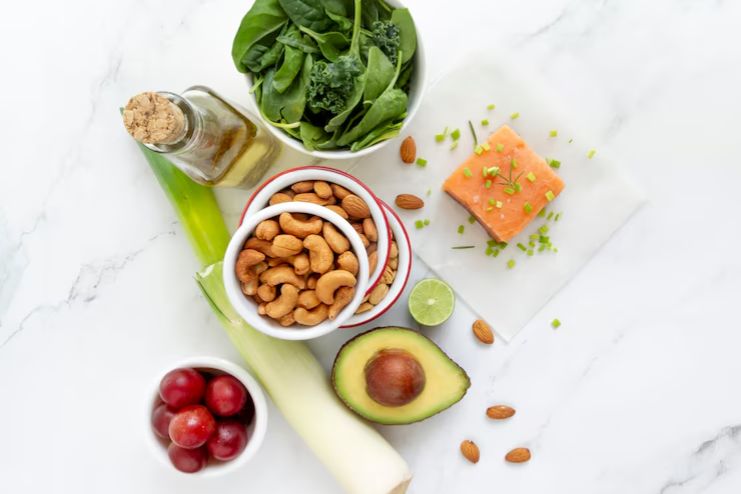
Healthy fats provide long-lasting energy and satiety.
Some examples are whole grain toast, trail mix with unsweetened dried fruit, avocado slices, and a handful of almonds.
4. Balance Carbs with Protein
Pair complex carbohydrates with protein to prevent blood sugar spikes and provide sustained energy.
Some examples are a whole-grain wrap with turkey, oatmeal topped with nuts, and apple slices with peanut butter.
5. Keep Portions in Check
Overeating often leads to sluggishness, and eating too little doesn’t satisfy hunger and energy needs.
Stick to a portion suitable for your needs, such as a handful of nuts or a serving of yogurt.
6. Snack at the Right Times

Snack when your energy levels naturally lower, like mid-morning. This will fuel you without interfering with your meals.
Refrain from snacking close to your meal timings to avoid overeating.
7. Stay Hydrated
Sometimes, dehydration causes fatigue. Hunger is not always the reason. Choose hydrating snacks to address this.
Cucumber, water-rich fruits like watermelon, a glass of infused water with mint and lemon.
8. Limit Added Sugars
Sugary snacks are unhealthy and cause quick energy spikes. This leads to energy crashes, leaving you fatigued.
Go for naturally sweet options like fresh fruit or unsweetened dried fruits.
9. Plan Ahead
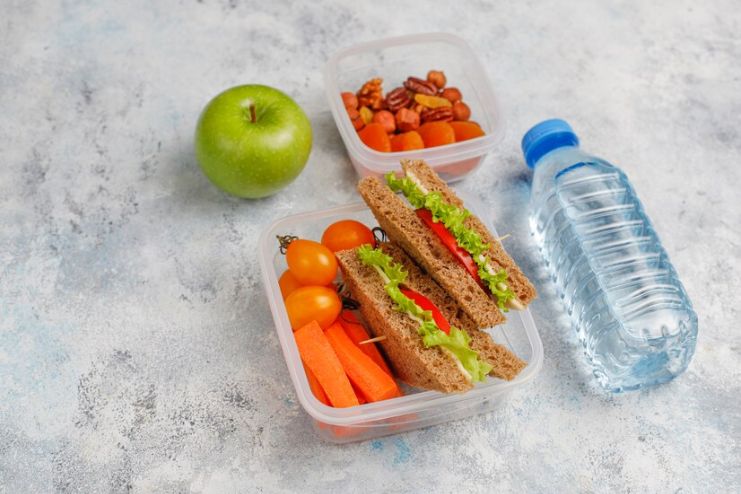
To resist the temptation of unhealthy snacks, have a healthy snack readily available. Plan to prepare such snacks at home instead of purchasing them from the market.
Keep a pack of nuts, seeds, and cut vegetables, and always keep them handy.
10. Experiment with Energy-Boosting Combos
Combine various nutrients for a variety of energy sources. Make a balance of the above-mentioned essential nutrients.
A handful of trail mix with chocolate, spinach, banana, almond butter smoothie, and pineapple with cottage cheese.
Foods to Avoid
Certain foods boost energy and fight fatigue, while others are the opposite. Some foods lead to energy crashes, sluggishness, and even long-term health problems. Let’s check which foods to limit or avoid to maintain steady energy levels.
1. Sugary Foods and Drinks

High-sugar foods, such as candies, pastries, soda, and energy drinks, cause a rapid spike in blood glucose levels, energy crashes, and fatigue.
Choose natural sweeteners or fresh fruits to satisfy your sweet tooth.
2. Fried and Fast Foods
Fried and fast foods are high in unhealthy fats and low in nutrients. These slow digestion and make you sluggish.
Go for grilled and baked alternatives with whole grain sides and vegetables.
3. Refined Carbohydrates
Refined carbohydrates are always dangerous to your health, causing energy crashes due to quick energy spikes.
Whole grain options like bread, pasta, and rice digest slowly and provide lasting energy.
4. Caffeine Overload
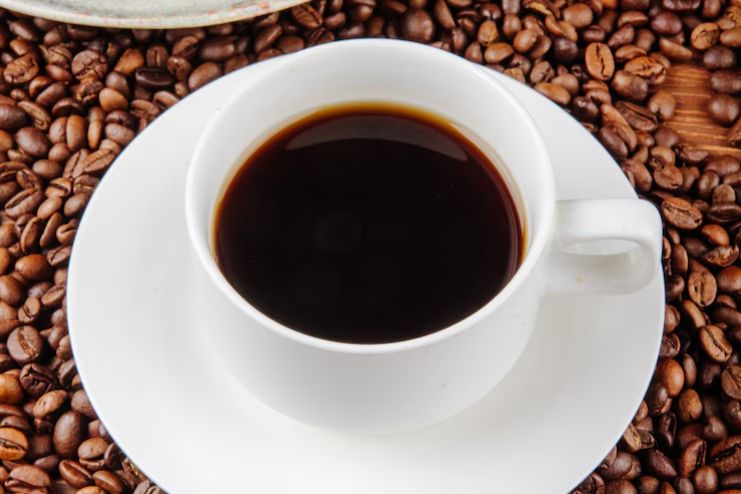
Caffeine temporarily boosts energy, but excessive consumption leads to dependence, jitteriness, or disrupted sleep, reducing energy over time.
Limit caffeine intake and take more caffeine-free herbal teas in the evening.
5. Energy Drinks
Energy drinks are full of sugar and caffeine. They provide a quick energy boost that leads to an energy crash. Regular consumption badly disrupts sleep patterns.
Go for unsweetened green tea or a glass of infused water.
6. Alcohol
Alcohol initially makes you feel relaxed but interferes with sleep quality and makes you fatigued the next day. It also brings long-term health problems.
Limit or avoid alcohol intake at least before bedtime.
7. Processed and Packaged Snacks
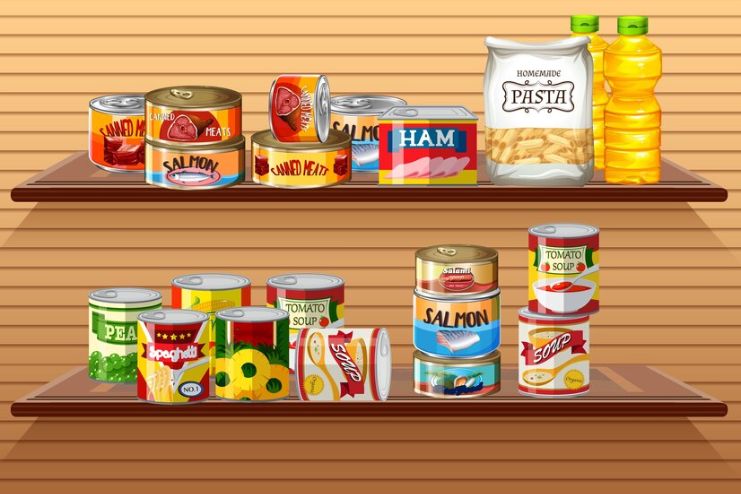
Processed and packaged foods, such as chips, cookies, and other processed snacks, can cause fatigue and health problems over time.
Try snacking on nuts, seeds, and air-popped popcorn for healthy options.
8. Low-Calorie Diet Foods
Foods usually labeled as “low-calorie” and “diet” lack the required nutrients to sustain energy levels and leave you hungry.
Go for nutrient-rich snacks with protein, fiber, and healthy fats.
9. Artificial Sweeteners
Artificial sweeteners are found in sodas and sugar-free snacks. They confuse your body’s energy regulation mechanisms and cause overeating and fatigue.
Opt for natural sweeteners like honey and maple syrup, but keep them in moderation.
10. High-Sodium Foods
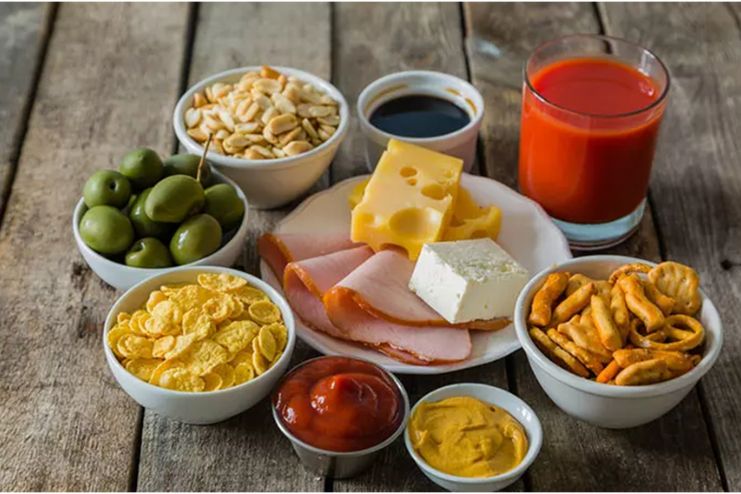
Processed meals and salty snacks cause dehydration, causing fatigue. Besides, these are associated with other problems like hypertension.
Choose sow-sodium options like packaged foods—season meals with herbs and spices instead of salt.
Lifestyle Tips for Sustained Energy
Opt for the proper lifestyle habits to maintain steady morning and night energy levels. Here are some practical strategies to overcome fatigue and keep your energy levels high:
1. Boost Magnesium Intake
Magnesium is required for over 300 biochemical reactions, including energy production. Magnesium deficiency leads to fatigue. Include magnesium-rich foods like whole grains, almonds, and fish.
2. Get Moving

Add light physical activity, like a 15-minute brisk walk, to fight fatigue and increase energy. Take regular breaks to walk around or stretch your body, especially when your tasks involve sitting for hours.
3. Power Nap When Necessary
A 20- to 60-minute power nap can refresh your mind and combat information overload. Plan naps in the early afternoon to avoid interfering with your nighttime sleep pattern.
4. Never Skip Meals
For a steady supply of energy, plan consistent meals, especially breakfast. Never skip your meals to avoid fatigue by the end of the day. Take balanced meals like whole grains, lean protein, and healthy fats.
5. Manage Stress

Chronic stress and suppressed anger drain energy, both physically and mentally. To relieve stress, practice relaxation techniques like meditation and breathing. You may also engage in a hobby.
6. Check Underlying Health Issues
Your fatigue, if persistent, may also indicate an underlying health condition like thyroid dysfunction or anemia. Consult your doctor immediately, get tested for thyroid function test (TFT), and get a complete blood picture (CBP).
Conclusion
Incorporate energy-boosting foods into your diet to combat post-meal fatigue and maintain a steady energy flow throughout the day. Prioritize whole grains, lean protein, healthy fats, fresh fruits and vegetables. Prevent blood sugar spikes and energy crashes and ensure you have sustained energy levels with the right foods.
With the right snacking ideas, proper hydration, and healthy lifestyle habits like regular physical activity and stress management, bring changes to your energy levels and productivity.
References
- https://www.healthline.com/health/food-nutrition/foods-that-beat-fatigue#whole-grains-and-complex-carbs
- https://health.clevelandclinic.org/foods-that-give-you-energy
- https://www.wellmark.com/blue/nutrition/20-fatigue-fighting-superfoods
- https://www.webmd.com/women/features/10-energy-boosters
- https://health.clevelandclinic.org/natural-energy-boosters
In this Article





















